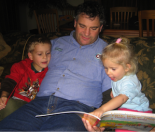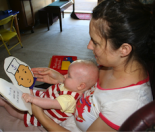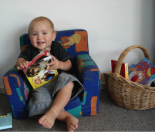The years leading up to school strongly influence your child’s attitudes and abilities towards reading. A home where stories are treasured and shared and where books are at a child’s level and explored daily will build a great foundation for literacy. Equally those first few weeks and months at school are important for your child in developing an enjoyment of reading, a positive attitude to learning and starting off as a confident reader. If you create a calm and positive environment where your child wants to read and feels confident in their abilities, these positive attitudes will flow on to their future years at school.
A strong foundation in reading helps with other learning too. Even with maths you often need to be able to clearly read and understand the question before you start.
Reading homework – schools vary on this but almost all will have reading homework each night in the first few years. Try having homework time at the same time each day after a snack and drink, and before your child gets too tired. Be really positive focusing on what your child gets right.
Some tips for correcting positively would be;
- Wait for your child to get to the end of the page or sentence rather than interrupting them. Revisit the word they got wrong. Ask, ‘do you know what this word is?’, if they get it right this time then offer praise, if not say the word for them.
- Encourage your child to use pictures as a clues. This is not ‘cheating’ in any way and is actually an important reading cue. Equally using memory to read is not cheating but one of the strategies children use when learning to read. You often hear people criticise “they’re not really reading they have just memorised the book” – but memorising a whole book, what a skill that is in itself! Memorising helps with recognising familiar, high frequency words.
- Look at unknown words in chunks and sound them out together.
When you have finished a book ensure your child has understood what they have read, by talking about what happened in the story. Often at the back of books from school there will be suggested questions to ask. Encourage your child to predict what is going to happen next in the story or link the story with their own life experiences.
If your child is getting tired or losing interest suggest you read a page each.
Variety – have them read to other siblings, grandparents and extended family. Your child will feel proud in sharing their new skill.
Share with your child’s teacher any particular interests your child has such as spiders, motorbikes or sea life. There may be books that the teacher can give around these interests.
Especially after initial reading assessments are done, teachers are skilled at matching reading homework that is the right reading level for your child. However, if you feel the books are too hard for your child, which will lead to frustration and loss of confidence, or too easy which can lead to boredom, talk to your child’s teacher. Don’t wait for school report time. Ask your child’s teacher about how their progress is going and for any ideas in which you can support them at home.
New entrant books have improved immensely and now feature lots of different cultures and different family make ups which is positive as children like to see their own life and experiences in books, as they can relate and identify with the story. Also reading books which feature cultures and families that are different from their own helps to foster acceptance and enjoyment of differences.
If English is not your first language ask about books in your home language both at school and at your local library.
Encouraging the reluctant reader
Model an enjoyment of reading yourself. Children are more likely to do what they see, not what they are told.
Broaden what you define as reading. Comics, E books, maps, and recipes could be alternative reading materials. Reading could also be poems or song lyrics.
Create your own books using photos as children love to be the ‘star’. For example use photos to make a book about “My 5th birthday” or “Our beach holiday”. Have a photo on each page and then a sentence below using your child’s words.
Children often relate to and look for how to behave with their own gender so boys will benefit greatly from reading with Dad/Grandad or Uncle, and it also reinforces the idea that reading isn’t just for girls.
Try not to compare. Comments such as, ‘but your big brother is such a good reader,’ will only create further negativity.
Give specific praise to your child. Rather than well done or good girl/boy you can say, ‘you knew every word in that sentence, fantastic’. Let them ‘overhear’ you saying how well they are doing with their reading, for example when talking on the phone to grandparents.
Continue to visit the library and let your child choose their own books so they can follow their own interests and make their own choices.
Here’s to a positive start to an exciting school year. Do you have a success story to share about your child’s reading or some strategies that you have found really useful?






